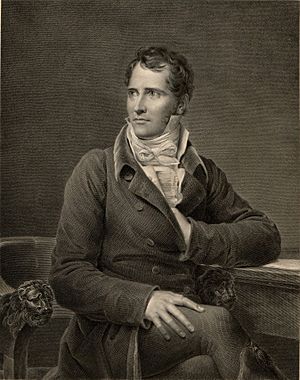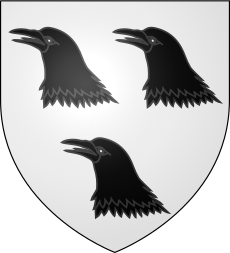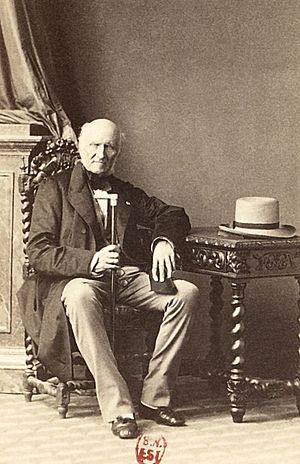Élie, duc Decazes facts for kids
Quick facts for kids
Élie Decazes
|
|
|---|---|

Portrait by François Gérard engraved by Paolo Toschi
|
|
| Prime Minister of France | |
| In office 19 November 1819 – 20 February 1820 |
|
| Monarch | Louis XVIII |
| Preceded by | Jean-Joseph Dessolles |
| Succeeded by | Armand-Emmanuel du Plessis de Richelieu |
| Minister of the Interior | |
| In office 29 December 1818 – 20 February 1820 |
|
| Prime Minister | Jean-Joseph Dessolles |
| Preceded by | Joseph Lainé |
| Succeeded by | Joseph Jérôme Siméon |
| Minister of Police | |
| In office 26 September 1815 – 29 December 1818 |
|
| Prime Minister | Armand-Emmanuel du Plessis de Richelieu |
| Preceded by | Joseph Fouché |
| Succeeded by | Office abolished (merged into the Interior Ministry) |
| Member of the Chamber of Deputies for Seine |
|
| In office 25 August 1815 – 4 October 1816 |
|
| Preceded by | Antoine Isaac de Sacy |
| Succeeded by | Casimir Périer |
| Constituency | Paris |
| Prefect of Police of Paris | |
| In office 9 July 1815 – 29 September 1815 |
|
| Appointed by | Louis XVIII |
| Preceded by | Eustache-Marie Courtin |
| Succeeded by | Jules Anglès |
| Personal details | |
| Born | 28 September 1780 Saint-Martin-de-Laye, Guyenne, France |
| Died | 24 October 1860 (aged 80) Paris, Seine, French Empire |
| Political party | Doctrinaires |
| Spouses |
Elisabeth-Fortunée Muraire
(m. 1805; died 1806)Wilhelmine de Saint-Aulaire
(m. 1818) |
| Children | Louis Frédéric Henriette |
| Education | Military School of Vendôme |
| Profession | Statesman |
| Signature | |
Élie Decazes (born September 28, 1780 – died October 24, 1860) was an important French statesman. He was a leader of the Doctrinaires party, a group of politicians who believed in a mix of royal power and individual freedoms. He played a key role during the time when the Bourbon kings returned to power in France.
Contents
Early Life and Career

Élie Decazes was born in Saint-Martin-de-Laye, France. His father was Michel Decazes. Élie studied law and became a judge in 1806. Later, he worked as a lawyer for the Court of Appeal in Paris.
He married Elisabeth-Fortunée Muraire in 1805, but she passed away the next year. In 1818, he married Wilhelmine-Egidia-Octavie de Beaupoil. They had three children: Louis, Frédéric, and Henriette. His son Louis later became the French Foreign Minister.
Becoming a Royalist Leader
After Napoleon Bonaparte's rule ended, Decazes quickly showed his support for the Bourbon kings. He stayed loyal to them even during the "Hundred Days," when Napoleon briefly returned to power. During this time, he met King Louis XVIII.
The King was impressed by Decazes' loyalty. On July 9, 1815, Louis XVIII made him the Prefect of Police for Paris. Decazes did very well in this challenging job. Because of his success, he was appointed Minister of Police on September 24, 1815.
Decazes was also elected as a Deputy for the Seine region in August 1815. As both a Deputy and a Minister, he became a key figure among the moderate Royalists. His main goal was to make France more loyal to the King, while also making the monarchy more connected to the people.
The moderate Royalists were a small group in the Chamber of Deputies in 1815. Decazes convinced King Louis XVIII to dissolve, or close, the Parliament. New elections were held in October 1816, and the moderates won a majority of seats. For the next four years, Decazes played a very important role in the French government.
Leading the Government
Decazes served as the Minister of the Interior from December 1818 to February 1820. During this time, his government decided to bring back the Exposition of French Industry. This was a fair where French businesses could show off their products. The first one was held in 1819.
As Minister of Police, Decazes had to deal with rebellions caused by the "Ultra-royalists." These were people who wanted the King to have even more power. After the previous Prime Minister resigned, Decazes took over the daily running of the government. He also held the Interior Ministry job at the same time.
Decazes believed in freedom, so he worked to get rid of the Ministry of Police. He also pushed for new laws about the press, ending censorship. His government improved France's finances and supported industries. They also started big public projects. These actions helped France's economy grow and made the government more popular.
However, other powerful European countries, like Austria, were worried about the rise of liberal ideas in France. They thought the French government was too "weak." In 1819, a famous liberal politician was elected, which worried these foreign powers even more. King Louis XVIII was pressured to change the election laws to prevent such "scandals" in the future.
Becoming Prime Minister

Because of disagreements over these changes, the previous Prime Minister and Finance Minister resigned. This led to Decazes becoming the new head of government in November 1819. He was now the President of the Council.
The changes to election laws made the radical politicians unhappy. Then, in January 1820, a revolution happened in Spain. Decazes' opponents accused him of causing problems. On February 13, 1820, a member of the royal family, the Duke of Berry, was assassinated. Decazes was wrongly accused of being involved in this crime.
Seeing the difficult situation, Decazes offered to resign to the King. At first, King Louis XVIII refused, saying, "They will attack not your system, my dear son, but mine." But in the end, the King had to give in to pressure from his family. On February 17, Decazes resigned. He was given the title of Duke of Decazes and sent to Britain as the French Ambassador.
This was the end of Decazes' time as a minister. In December 1821, he returned to France and became a member of the House of Peers. He continued to share his liberal views there. After 1830, he supported the new July Monarchy government. He retired from public life after 1848.
In 1826, Decazes started a group to support the coal and iron industries in the Aveyron region of France. A town in that area was named Decazeville in 1829, after him.
Honours
 Duke of Decazes (French title), 1820
Duke of Decazes (French title), 1820 Duke of Glücksbierg (Danish title), 1818
Duke of Glücksbierg (Danish title), 1818 Chevalier, Ordre du Saint-Esprit
Chevalier, Ordre du Saint-Esprit Grand-croix, Légion d'honneur
Grand-croix, Légion d'honneur Knight, Order of the Elephant
Knight, Order of the Elephant
See also
 In Spanish: Élie Decazes para niños
In Spanish: Élie Decazes para niños
- Duke of Decazes
- List of Ambassadors of France to the United Kingdom
 | Bayard Rustin |
 | Jeannette Carter |
 | Jeremiah A. Brown |

